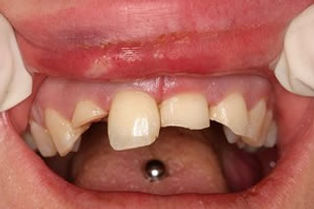Oral piercing - is it really worth it?
A pierced lip or tongue may look cool, but it can be dangerous.

If you're thinking about getting a piercing, or if you already have one or more, here are some health risks you should know about. In particular, piercing the tongue, lips, cheeks, or the uvula (the tiny tissue that hangs at the back of the throat), is not as safe as you may think. That's because the mouth's moist environment is home to huge amounts of bacteria, creating an ideal place for infection to start. That's only one of many problems piercing can cause.
The risks
Allergic Reactions
The metal may cause an allergic reaction
Swelling
Swelling commonly occurs after oral piercing. There have been some reports of swelling after tongue piercing that has been serious enough to block the airway.
Infection
When you think about it, this really should come as no surprise.
The mouth and nasal passages are a veritable incubator of nasty disease-causing bacteria. We all suffer sore throats, respiratory and nasal infections as a result, some of them quite serious. The surprising thing is how resistant our vulnerable tongue is to infection - unless you poke a hole through it. The tongue is shielded with a thick, tough outer layer of skin and it is bathed continually with saliva containing antimicrobial proteins.

In contrast to earlobes, the tongue is richly supplied with blood, which provides an invading germ ready access to the blood stream, to spread infection throughout the body. The veins that drain the tongue connect directly to the internal jugular vein, which is a direct route into the brain.
Prolonged bleeding
Damage to your tongue’s blood vessels can cause serious blood loss.
Bloodborne Disease Transmission
Oral piercing has been identified as a possible factor in transmission of hepatitis B, C, D and G.
Damage to teeth and gums
Lip and tongue piercings rub against the gums and teeth. Over time this can cause the gums to pull away from the teeth, leaving the root exposed. This can be very sensitive.
Some people also develop a habit of biting the barbells, or playing with the balls in their mouths, which can injury the gums and lead to cracked, scratched or sensitive teeth.

This damage may result in the need for dental treatment, such as crowns, fillings or root canals.
Heart and brain problems
Oral piercing carries a potential risk of endocarditis, and inflammation of the heart valves or tissues. Bacteria can enter the bloodstream through the piercing site in the mouth and travel to the heart, where they can multiply. These harmful effects can happen during the piercing, soon after, or even long after the procedure.
Deaths have been recorded in previously healthy young people following oral piercings. Bacteria can pass through the bloodstream and cause a potentially fatal infection in the brain.
Drooling and difficulty speaking and eating
Mouth jewellery can cause excessive saliva production. It can also affect your ability to pronounce words clearly. Hoops, rings, studs and barbells can also get in the way of your ability to talk and eat.
Nerve damage
If this happens, you may experience temporary or permanent damage. The injured nerve might make your tongue feel numb. Other injuries could change your sense of taste or how you move your mouth.
Oral cancer
Since the tongue repeatedly rubs against the same areas, people with tongue piercings may develop mouth ulcers from constant irritation. These ulcers can result in oral cancer. Precancerous ulcers can only be detected during an oral cancer screening by the dentist.
Accidentally swallowed or inhaled jewellery
This can cause injury and may require surgery to remove.
Avoiding the Risks
If you still want to have your tongue pierced, we strongly encourage you to reconsider. However, if these statistics and risks haven't changed your mind, follow a few precautionary guidelines to protect your oral and overall health:

-
Choose a reputable piercing studio. Ask about sterilisation procedures, and make sure you're comfortable with the level of infection control the studio practices
-
Ask your piercer about after care, and follow cleaning instructions to the letter. Rinse with mouthwash multiple times daily, and brush your teeth and tongue jewellery to remove plaque
-
Purchase a starter barbell made from surgical stainless steel to prevent an allergic reaction. Jewellery with plastic balls are gentler on teeth and oral tissues
-
Once your tongue is pierced, we recommend that you don't touch the piercing since this can cause infection from bacteria on your fingers. If you see any sign of infection, see your dentist immediately
-
People with pierced tongues should practice a stellar oral hygiene regimen
-
Always remove the jewellery when eating or sleeping to avoid damaging teeth and oral tissues
-
Piercing parlours sell plastic plugs to retain the piercing when jewellery is not worn
-
Most importantly, people with pierced tongues should see a dentist regularly to make sure tongue and teeth stay healthy
How to find us
Modern Dentistry
Level 1 City Walk Centre
City Walk
Civic
Canberra
ACT 2601
Above King O'Malleys Pub
Work: 02 6247 8400
Opening Hours
Modern Dentistry
Monday - 8:30 am - 5:30 pm
Tuesday - 8:30 am - 5:00 pm
Wednesday - 8:30 pm - 5:30 pm
Thursday - 8:30 am - 5:30 pm
Friday - 8:00 am - 3:30 pm
Saturday - Closed
Sunday - Closed
